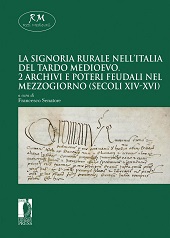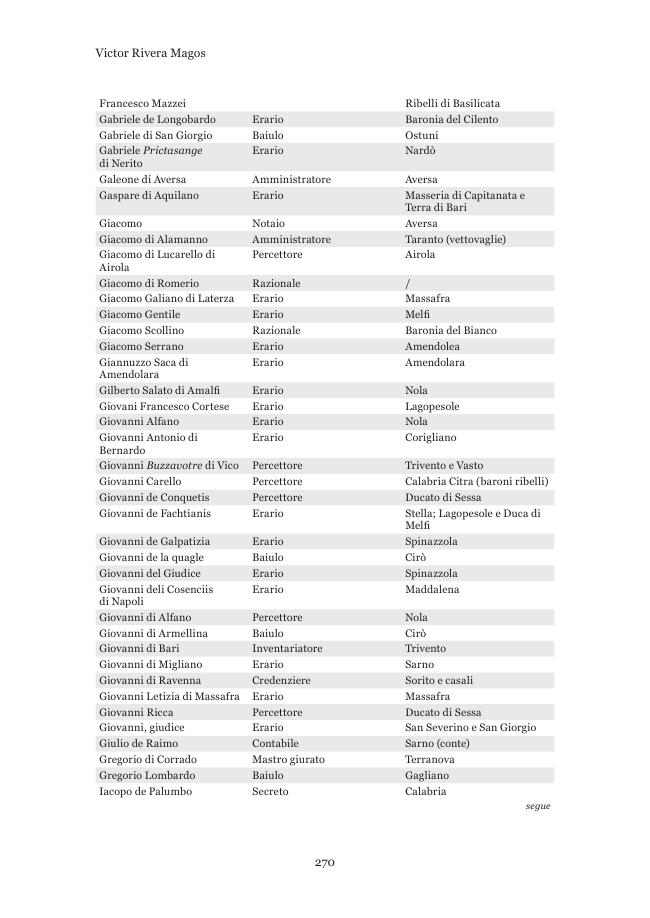La signoria rurale nell'Italia del tardo Medioevo
545 p. : ill.
Includes bibliographical references and index.
By studying the archives of the feudal Lords of Southern Italian between the 14th-16th centuries you can understand the real nature of their power and how it was expressed. The volume, which takes into account the most recent historiography, relies on the study and inventory of important documentary collections held in the Archivio di Stato of Naples, such as the Sommaria (Relevi with the files for feudal succession; Dipendenze, I, Conti erariali dei feudi and Diversi, with the seigneurial account books acquired by the State of those lord who had been rebellious or had died without heirs). The authors deal also with the cartularies ('platee') of aristocratic dynasties as the Ruffo and the Sanseverino, based in Calabria, and with the parchments of the Albertini from Nola.
Thanks to the rich information derived by these archival series and account books, the authors bring new light on the seigneurial powers, the typology of the records produced by and for the Lords, the administration of their estates, the strategy for elaborating the family memory. Francesco Senatore teaches medieval history at the University Federico II of Naples. His scientific work focuses on the 14th to the 16th centuries, comparing and contrasting Italy, in particular Southern Italy, with other areas of Europe on a range of themes: political and cultural history, the history of institutions, diplomatics and archival science. His main topics are Italian diplomacy, letters and letter-writing, urban history, institutions, and written records. [Publisher's text]
Studiare gli archivi dei signori rurali del Mezzogiorno d'Italia tra XIV e XV secolo significa cogliere la natura del loro potere, il modo in cui esso si diceva. Il volume, che accoglie le sollecitazioni della storiografia più recente, è fondato sulla repertoriazione di importanti complessi documentari dell'Archivio di Stato di Napoli, fondo Sommaria (Relevi, con i dossier per la successione feudale: Dipendenze, i Conti erariali dei feudi e Diversi, con registri signorili pervenuti al Fisco per confisca o morte senza eredi). Sono inoltre oggetto di studio i cartulari e le platee calabresi, tipici «libri-archivio» che inglobano repertori più antichi (famiglie Ruffo e Sanseverino), e le pergamene degli Albertini di Nola.
La ricchezza informativa dei fondi archivistici e dei registri presi in considerazione consente agli autori di concentrarsi sulla sostanza dei poteri signorili, la tipologia delle scritture prodotte dai signori e per i signori, la loro gestione del patrimonio, le strategie di costruzione della memoria. Saggi di R. Berardi, P. d'Arcangelo, V. Rivera Magos, S. Pollastri, L. Petracca, L. Tufano. Francesco Senatore insegna storia medievale alla Federico II di Napoli. Studia l'Italia, in particolare il Mezzogiorno, nei secoli XIV-XVI, con un interesse per la comparazione con altre regioni europee, nell'ambito della storia politica e culturale, della storia delle istituzioni, della diplomatica e dell'archivistica. Le sue ricerche riguardano soprattutto la diplomazia italiana, le corrispondenze epistolari, la storia urbana, le istituzioni e la produzione documentaria. [Testo dell'editore]
Contributions in Italian, one in French.
Collected essays.
Notas de contenido
- 2. Archivi e poteri feudali nel Mezzogiorno (secoli XIV-XVI) / a cura di Francesco Senatore. - 2021.
-
Información
ISBN: 9788855183017
COLECCIÓN



